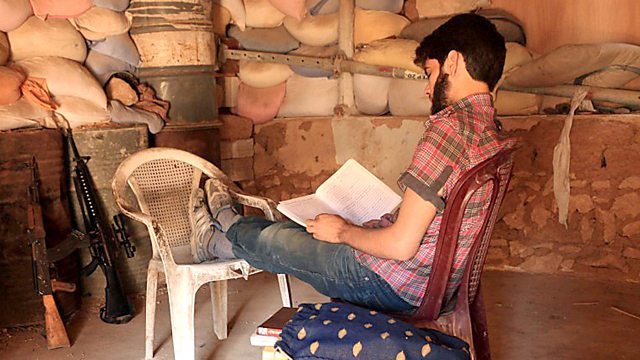
'Syrian authorities backed by Russia on Thursday offered safe corridors out for residents and rebels in the city of Aleppo's besieged quarters.
Rebels and residents of Aleppo said they were skeptical of the safe-corridors offer, saying it presents them with an impossible choice between a slow death if they stay behind and possible detention if they attempt to leave. There was no sign of people massing to leave the besieged parts of the city.
"I will not leave. I will be the last man in the city," said Mohammed Zein Khandakani, 28, a resident of the Maadi neighborhood of Aleppo who volunteers with the city's medical council. "I can't imagine ever seeing a member of this regime one more time."
But Khandakani, formerly a lawyer who was detained for a month in the early days of the protests against the Syrian government, said he was worried about his family.
A father of two -- the youngest a girl of 9 months -- he said that despite the risk of maltreatment and even arrest, he is urging his mother, wife and sister to use the safe passages to leave the city. He said he hopes the Russian role and intense international attention to the humanitarian corridors proposition means the government would abstain from flagrant violations.
Few residents of eastern Aleppo said they expected good treatment if they accepted the government's offer.
"All the passages are going to the Assad regime," said Farida, a doctor in an Aleppo hospital who gave only her first name for safety reasons. Surrendering, she said, would mean, "death or jail," while the latter would eventually mean "death in the jail."
She acknowledged, however, that some civilians want to leave.
Aid groups have been warning of an impending siege, and with it a humanitarian crisis, after government forces cut the last road connecting Aleppo's eastern districts to rebel-held areas to the north.
Zaher Azzaher, an activist in Aleppo, said residents had begun to feel the pinch; one of his neighbors had acquired two barrels of fuel, and scores of people had lined up to get a share, he said.
"People are fighting over two bags of eggplants," he said. "I don't know how these eggplants managed to find their way here."
He said some residents hesitated to eat the food packs dropped from the air, out of fear that they might be poisoned.
Khandakani said life has progressively gotten harder under the 10-day old siege with bread and water shortages and electricity finally going out Wednesday.
"The next 48 hours are fateful for the whole revolution," he said via Whatsapp.
Youssef Rahal, a lawyer from Aleppo who left the city 10 days ago but remains in touch with people inside, said there is no way to get in vegetables or diesel fuel, which rebel-held areas used to buy from the market and transport through the now blockaded Castello Road.
This has affected bread production. "It means some people are getting only a quarter loaf of bread a day," he said.
This has affected bread production. "It means some people are getting only a quarter loaf of bread a day," he said.
Russia's defense minister said in televised comments that President Vladimir Putin has ordered a "large-scale humanitarian operation" that will begin outside Aleppo to help civilians as well as allow fighters who wanted to lay down their arms to surrender.
Shoigu said three corridors will be open for civilians and fighters who lay down their arms and a fourth corridor will provide fighters a "safe exit with weapons."
Bahaa Halabi, an opposition media activist inside Aleppo, said there are no corridors out of east Aleppo and even if there were, he would not take them.
"Definitely not. We will not surrender ourselves to the criminals. They are killing us every day. Slaughtering us, starving us, and besieging civilians," he said, speaking from the city via Skype.
Assad has issued amnesty offers several times during Syria's civil war, now in its sixth year. The latest offer, like those before it, is largely seen by opposition fighters as a publicity stunt and psychological warfare against the rebels. More than a quarter of a million people have died and millions have been displaced since March 2011, when Syria's conflict broke out.
Khandakani said the offensive and siege is depriving him of his "brief feelings of independence and freedom" living in the part of the city under rebel control since 2012.
Khandakani said the offensive and siege is depriving him of his "brief feelings of independence and freedom" living in the part of the city under rebel control since 2012.
"I am still waiting for a miracle. Something extraordinary, like the rebels for instance managing to open a corridor for us toward the liberated rural areas," he said.'
'Russia's "humanitarian corridor" in Syria. F**k the Putin,Obama,Assad,UN, and Arab world especially.'
[https://twitter.com/Malcolmite/status/759072634319536128]
'Russia's "humanitarian corridor" in Syria. F**k the Putin,Obama,Assad,UN, and Arab world especially.'
[https://twitter.com/Malcolmite/status/759072634319536128]



